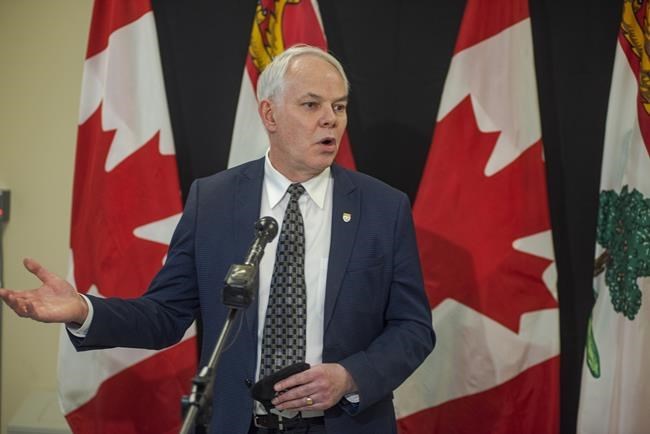CHARLOTTETOWN — As the Prince Edward Island election approaches its final week, the Green Party is fighting to hold onto its historic gains from the last provincial vote — a battle some experts say could result in lost seats.
Hannah Bell, a Green MLA who decided not to seek re-election, says the party simply wasn’t ready for this campaign.
While Progressive Conservative Leader Dennis King did call the vote six months before the province’s fixed election date, Bell says all political parties knew a campaign was coming this year. She says her party was not doing enough grassroots work or planning in the months and years leading up to the April 3 vote, leading her to believe the party's seat count may suffer.
“I do feel, and I have been saying this internally and externally, that the Green Party has missed an opportunity to build momentum in advance of an election,” Bell said.
“You need to start planning for the next election the minute you finish an election. And in hindsight … the Greens struggled with building and expanding on the fact they had such a momentous impact from 2019.”
The P.E.I. Green Party made history four years ago when it won eight seats in the legislature and became the first Green official Opposition in North America.
The PCs formed a minority government, becoming the first one the province had seen since the 19th Century. That gave Peter Bevan-Baker’s Greens more influence and opportunity to advance initiatives and policies than opposition parties of the past, although the Tories did secure a slim majority after a 2020 byelection.
Today, however, the Green Party’s momentum appears to have stalled. At the outset of the campaign, the Greens were polling well behind the PCs. A Narrative Research poll suggested the Greens had the support of 22 per cent of decided voters in February, compared with 49 per cent support for the Progressive Conservatives.
The Greens have also struggled to attract candidates and were forced to leave two ridings without anyone carrying the party banner.
“I won't pretend that I'm not disappointed that we don't have a full slate, and I can tell you it wasn't for lack of trying,” Bevan-Baker said in a recent interview.
Many supporters have expressed a desire to run for the party over the last four years, but found it hard to drop everything to run when the early election call came, he said.
Some also expressed a reticence to run due to the challenges of public life and how “ugly and petty and cruel that can be,” Bevan-Baker added. “I think that puts some people off, particularly people from marginalized communities and women."
Both Bevan-Baker and Bell said they believe the public mood is also hurting the Greens. Both say they felt Islanders viewed 2019 as a “change election,” while this campaign does not have the same energy.
But Bell also says she believes the party should have been doing more to prepare well before the lead up to this campaign. For example, the party has only established a handful of district associations and has not been expanding its membership in areas outside of the urban ridings where its support is strongest, Bell said.
She blames the party’s “inexperience” in elected office — no Green MLA was ever elected in P.E.I. before 2015 — but also says her colleagues and party staff have been more focused on policy than on building the grassroots.
Don Desserud,a political science expert based in P.E.I., says he believes the Green Party’s breakthrough four years ago was due largely to disaffected Liberal voters looking for an alternative after 12 years of Liberal governments.
That’s why he says this election will be a test of how much support the Greens are able to retain, or whether 2019 was an “aberration” in a province that has typically elected either Liberal or PC MLAs.
Desserud said some disaffected voters who were parking their votes with the Greens in 2019 may have grown to like the party.
“But when I look at those polling numbers, I don't see that," he said. "I see the Greens back to where they were before.”
The Liberals, who had four seats heading into the election, have been polling well behind the PC party and slightly behind the Greens. They are also not running a full slate of candidates for the first time since 1919.
Liberal Leader Sharon Cameron has made it her focus to target the Green Party in this campaign in an effort to win back some of those disaffected voters. Cameron has even taken the unusual step of running against Bevan-Baker in his riding, breaking the political convention of not pitting leaders against one another.
P.E.I. historian Ed MacDonald says the province's two-party system is deeply entrenched in older generations of Islanders, many of whom saw their party allegiances as a kind of family inheritance.
But he says the Greens could maintain their gains and attract new voters, given the shifting demographics of the Island thanks to population growth from aggressive immigration efforts.
“The electoral landscape on P.E.I. has been and is changing,” he said.
“There are a lot more newcomers to Prince Edward Island from other parts of Canada, from other areas of the world who don't share in that traditional kind of electoral inheritance. So the swing vote, I think, is much larger than it ever was, especially in urban areas.”
Bevan-Baker says criticism of his party’s election readiness is “fair,” but he remains hopeful that Islanders will focus on the Greens’ substantial work over the last four years in Opposition, including getting 18 bills passed into law.
“We showed that we deserve to be there,” Bevan-Baker said.
This report by The Canadian Press was first published March 26, 2023.
Teresa Wright, The Canadian Press
Note to readers: FIXES FORMATTING ERROR



